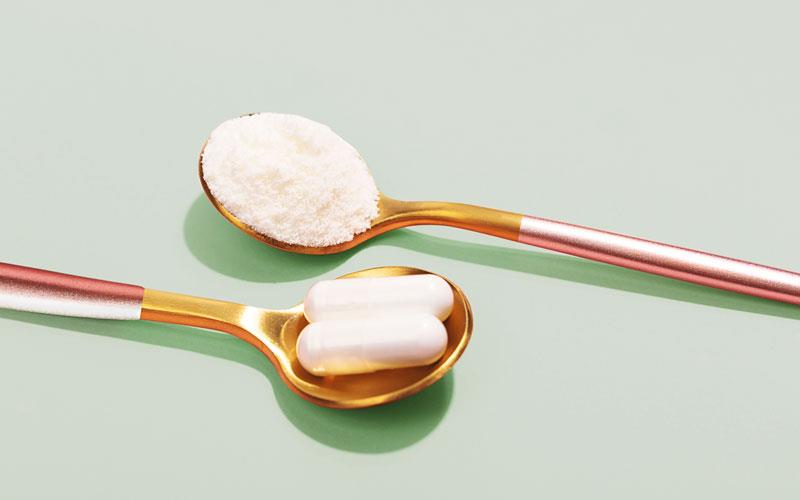 Collagen. Everyone’s talking about it and more and more people are searching for information on how they can boost their levels. There are some interesting methods out there – you can even drink gin-infused collagen!
Collagen. Everyone’s talking about it and more and more people are searching for information on how they can boost their levels. There are some interesting methods out there – you can even drink gin-infused collagen!It may be a beauty buzzword but what does collagen do exactly, how can you make more of it, and how does your skin benefit?
Collagen is a protein made of amino acids that is secreted mainly by connective tissue cells. It provides structure and strength to skin, bones, tendons and ligaments. There are 28 types of collagen, although type 1 comprises over 90 per cent of collagen in the human body.
In abundance, collagen plumps the skin, keeps wrinkles at bay and improves firmness and elasticity.
But unfortunately collagen starts to deplete as we age – this is partly genetic and partly down to those pesky free radicals including UV light, pollution and less-than-saintly lifestyle habits including smoking and a high sugar diet. The menopause also causes a considerable decline in its production.
So how can we help boost collagen production and quality? The good news is as collagen is resorbable, meaning it can be broken down, converted and absorbed back into the body, there are a few options – one of them won't cost a penny.
Sleep
The saying, ‘I need my beauty sleep’ isn’t a myth: skin makes collagen when you sleep, so good quality slumber is essential.Studies have shown that sleep plays a role in restoring immune system function, and that changes in the immune response may affect collagen production.
It’s definitely worth paying attention to your sleep hygiene – maintaining a regular and consistent routine, making sure your bedroom isn’t too hot, resisting using devices with bright screens just before bedtime and using sleep aids such as masks and earplugs can be hugely beneficial to those collagen levels.
Vitamin C
If you want to boost your collagen from the inside, the first thing you should do is address your vitamin C intake, as this nutrient helps the body to create collagen by enhancing collagen synthesis.Add oranges, red peppers, kale, new potatoes, broccoli and strawberries to your shopping list, or use a good supplement; The Organic Pharmacy's Vitamin C Ester, £18, helps to protect cells from stress, while contributing to the function of the immune system and collagen formation.
We also like Holland & Barrett Pure Vitamin C Powder, £12.99 which is easy to take and contains 2500 mg of vitamin C per serving.
Collagen supplements
“Studies have shown that consuming collagen can improve skin elasticity, moisture and firmness, while reducing wrinkles,” said Dr Tal Friedman, Head of Naturopathic and Research & Development Specialist at Thailand’s Chiva-Som health resort."In fact, one study showed that taking a collagen supplement along with vitamins C and E for 12 weeks significantly reduced wrinkle depth.”
However not all collagen supplements are created equal: collagen tablets only have an absorption rate by the body of 30-40 per cent, compared to 90-95 per cent for liquid forms.
YourZooki Collagen Zooki Liposomal Collagen, £27.99 for 14 sachets, contains 5000mg of hydrolysed marine collagen and 30mg of vitamin C; it’s also rich in Type 1 collagen, the most abundant form of collagen found within the body and hydrolysed into individual collagen peptides. Easily digestible, it is efficiently transported around the body.
Reality TV star Sam Faiers’ skincare supplement Revive Collagen, £33.99 for 14 sachets, uses 8,500mg of Type 1 hydrolysed marine collagen (which is said to be more effective than other collagen products), collected from ethically farmed fish skin which breaks down into small chains, resulting in collagen peptides. With a 90-95 per cent absorption rate, its active ingredients work quickly from the inside out.
Home use devices
Why not try a high-tech home use device in conjunction with an in-clinic treatment regime, to really max out on boosting that collagen?Red light works to stimulate the production of collagen, elastin and fibroblasts by delivering safe, concentrated wavelengths of light into the skin. Wavelength is important: look out for 660 nanometers of light which is more quickly absorbed and ideal for skin beautifying.
Traditionally used in targeted aesthetics treatments, red light is now also found in DIY devices – we like SKN Rehab LED Mask, £150, a futuristic-looking mask that uses colour light therapy (UV free) in a spectrum of wavelengths delivered via tiny LED bulbs.
It includes red light which is scientifically proven to stimulate collagen while helping to speed up the skin’s natural healing process.
In-clinic options
"There are currently some excellent treatments for collagen production in the field of medical aesthetics, both invasive and non-invasive,” says Etre Vous Expert Dr Ioannis Liakas.“Currently, the most efficient non-invasive intervention for collagen stimulation is the combination of microneedling and radio frequency, delivering thermal energy deep within the layers of the skin with the Morpheus8 device.
“If a client chooses a more traditional method to stimulate collagen with injectables then we suggest Ellansé or Silhouette Soft threads.”
Ellanse is a collagen stimulating dermal filler used in the skin’s deeper layers. It works to stimulate the natural collagen over time, which can help to plump skin, fill facial contours and improve skin health. Lasting longer than traditional fillers, the results can last up to four years.

Ioannis Liakas, Medical Director
Dr Ioannis Liakas is a shining gem in the aesthetics world. Prior to becoming an industry leading practitioner, he worked...
Book with Ioannis Liakas By Rebecca Barnes
By Rebecca Barnes